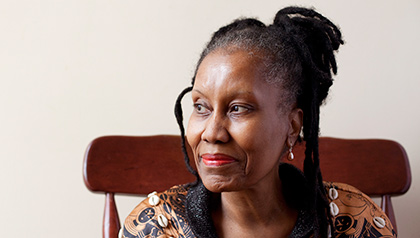AARP Hearing Center

Joseph Sjostrom
Paula Dianne Butler, 61, is a retired Chicago teaching assistant with no legal background, so she knew that a day in court would be full of surprises. She just wasn’t expecting them to be pleasant.
A visit to the Circuit Court of Cook County Elder Justice Center, however, turned her day in court from a fearful experience to a positive one. The center, which opened in September, was expressly designed to enhance access to the court for older people. And that’s what it did for Butler.
“A young lady in the justice center—oh, she was young enough to be my granddaughter—really made it so easy for me,” she said.
Butler went to the courthouse to file a small claims suit against a flooring company. She ultimately won a restitution order.
The Elder Justice Center—located on the concourse level of Chicago’s Daley Center, the county’s main court and judicial administration building—does not provide legal representation.
Instead, law students who work there analyze an older person’s situation and help determine what kind of professional service, if any, is needed. They also help the person make appointments with the appropriate provider, such as a legal aid clinic or social service agency dealing with housing or mental health, for example.
Navigating the system
The center staff might also check a case file or assist in gathering documents and other materials that a lawyer would need, or help a client fill out forms.
“We help people identify issues that confront them, we give them guidance to their destinations, and we contact [legal aid or social service] agencies on their behalf,” said Judge Patricia Banks, presiding judge of the circuit court’s Elder Law & Miscellaneous Remedies Division.
The law students are trained to be alert for signs of abuse, neglect or exploitation by caregivers and even family members.
Another woman arrived at the center with papers indicating she faced eviction from her apartment.
“Her bank account was frozen because she owed money in another civil case,” said Barry Kozak, director of elder law programs at John Marshall Law School in Chicago and a volunteer supervisor of law students at the Elder Justice Center.
Without access to her funds, she faced eviction from her home.
“We took her to the court clerk’s office and pulled the file [on the case that froze her funds] and made a copy of it. Then we connected her with a legal aid attorney who was able to get right to work and help her that day,” Kozak said.
Serving those 60-plus
The Elder Justice Center will discuss legal issues with residents of Cook County age 60 and older. Appointments are suggested, but walk-ins are welcome.
“We’re thrilled with what the Elder Justice Center is doing,” said Gerardo Cardenas, AARP Illinois communications director. “They’re filling a tremendous void in doing outreach and education in the area of financial abuse of the elderly and in helping people navigate the courthouse.”
AARP volunteers have been asked to be alert for attorneys and others who might be interested in volunteering and to refer them to the center.
The Elder Justice Center is at 50 W. Washington St., telephone 312-603-9233. Security guards and many court staff members know where the center is located.
There is a similar operation in downstate Illinois: the Elder Financial Justice Clinic at the University of Illinois College of Law in Champaign. It is directed by Matthew Andres, an assistant clinical professor there.
The clinic opened in August and represents older people who are victims of financial fraud. The clinic can be contacted at 217-244-9494.
Joseph Sjostrom is a freelance writer living in Oak Park, Ill.































































